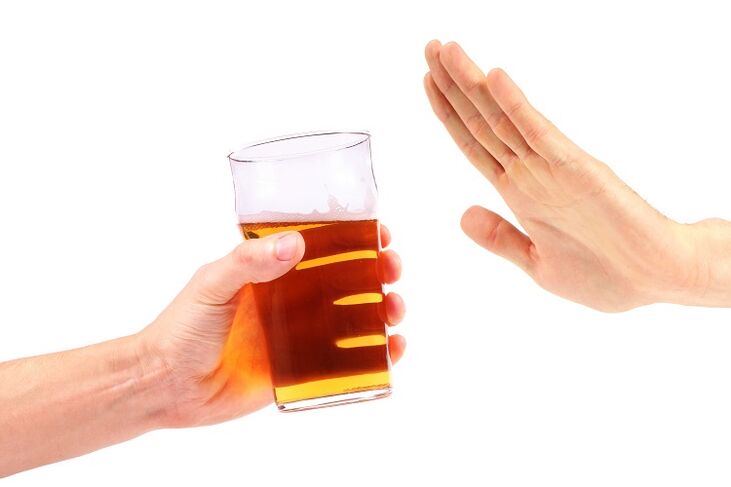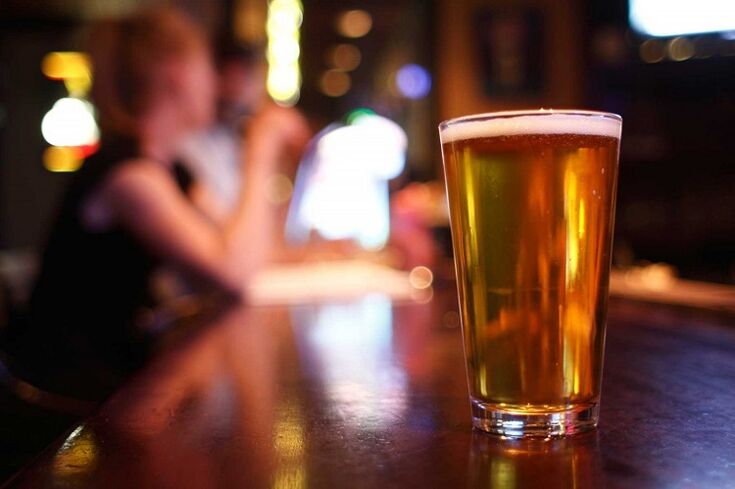At the end of a hard day's work, you want to relax with a glass of wine or a can of beer. It seems, what will happen if you drink alcohol "for fun" every day?
The so-called "evening alcoholism" does not arouse open disapproval in society. At first glance, nothing serious happens: there is no instant withdrawal syndrome from a glass of vodka. But the frequent consumption of alcohol affects the human body, regardless of the "elite" of drinks. Successful young people between the ages of 25 and 40, who buy expensive brandy, don't even notice the last link in the alcohol chain that is in the same queue as them - a haggard, unshaven man. to wrinkled clothes. If you imply that this is your possible future, they will surely be offended. However, if a person drinks alcohol every day, soon he will have to pay not only with money, but also with his health, family ties and position in society.
The insidiousness of ethyl alcohol
The amount of alcohol consumed in terms of pure alcohol should not exceed 5ml / day (women) and 10ml / day (men). It is better to divide it into several tips. That is, 25 ml of strong drink, 100 ml of wine, 250 ml of 3-4% beer drunk at the festive table will not cause destructive damage to a woman's body (for men, the quantity doubles). However, the frequency of use of these "harmless" doses makes them dangerous.
The destruction of the body begins gradually. It directly depends on age, health, weight, hereditary predispositions. With an unfavorable coincidence of these factors, the first stage of alcoholism can occur in six months or a year. And a person who abuses alcoholic beverages will live the rest of their life in alcoholic drugs.

Psychic changes
As the daily consumption of alcohol aims to rapidly obtain a psychotropic effect ("relaxation"), psychological dependence occurs first. After a week, a person gets used to relieving stress in this way, without a break to sober up, and after a year he forgets that it could be different.
The main symptoms of what is happening in the body:
- Insomnia. Despite the strong hypnotic effect of ethanol, the phases of healthy sleep are disturbed under its influence. Sleep becomes either deep narcotic, or vice versa - short, restless. Thereafter, a person should drink alcohol only to fall asleep.
- Nervousness and irritability. The constant presence of alcohol in the blood causes oxygen deprivation of the brain. Associated with sleep disorders, this leads to fatigue, which causes earlier consumption. This is how a "vicious circle" is formed.
- Lowering of the criticality threshold. A person begins to react sharply to comments ("Yes, I drink constantly, but what's so terrible about it? "), Constantly finds new reasons to drink.
- Look for a reason. Gradually, festive feasts and small doses are replaced by abundant drinks on television every night. The patient is ready to blame the whole world for having a definite reason for taking another dose.
- Growing aggressiveness. The majority of domestic crimes occur in the first and second stages of alcoholism. Imaginary courage makes one seek adventure, the affair often ends in fights.
Physiological changes
The consequences of long-term alcohol consumption are irreversible disorders in the body.
- Change in blood composition. Literally a few hours later, glucose levels drop, thrombus formation increases, and blood circulation deteriorates.
- Avitaminosis. Against the background of general intoxication, the lack of vitamins seems to be a small problem. Gradually, however, it leads to hair loss, destruction of tooth tissue, indigestion, and decreased immunity. Perhaps the development of anemia, early dementia, acute clinical depression.
- Aging effect. Classic signs of an alcoholic are swelling of the face, vascular "stars" on the cheeks, pale or purple-cyanotic skin. The person appears to be 10 to 15 years older than the passport age. The appearance of women changes particularly quickly.
- Destruction of nerve cells and tissues of internal organs. Absorbed through esophagus, ethanol with bloodspreads to all cells of the body, gradually affecting the liver, kidneys, stomach, brain.
Big belly and slender legs - all the "delicacies" of alcoholism with beer
Beer is one of the most insidious drinks. The stores offer a wide selection of a wide variety of varieties, the advertisements encourage you to "cool off". Initially, weak psychological alertness, triggered by strong alcohol, leads to increased alcoholism from domestic beer.
Unlike vodka, beer has a lower calorie content, is easier to tolerate, and has mild hangover syndrome. However, if you drink it daily, the effects will be the same.
The elements in beer affect the production of hormones. In men who are addicted to beer, the breasts grow larger, fat is deposited on the stomach and sides, the timbre of the voice becomes higher, impotence develops. If a woman drinks a lot of beer, she acquires masculine features: her voice thickens, antennae begin to grow above the upper lip, the figure becomes stocky, masculine.
Alcoholism in beer gradually destroys the hormonal system. Infertility, tumors of the thyroid gland, diseased pancreas - this is just a small list of problems associated with the abuse of foamy drinks.
But beer has the most damaging effect on the heart. In people who periodically drink up to 3-5 liters of beer per day, the volume of the heart muscle increases several times. The so-called "bovine heart" effect occurs, which doctors call cardiomegaly. Muscle tissue gradually degenerates, shortness of breath appears, the heartbeat is disturbed. In the future, the "bull's heart" threatens serious complications.

It is important to remember that small doses of ethanol in beer lead to the formation of alcohol dependence. Only, it is much more difficult to find it.
Is the truth in the wine?
Speaking of the relative usefulness of wine, doctors mean drinks that are products of the fermentation of grapes, with a strength of no more than 13%. A glass of dry wine a week will do no tangible harm.
However, excessive passion for them has the same sad consequences that occur with alcohol consumption. Wine causes the destruction of the limbic system of the brain, which is responsible for memories and emotions. The abuse of wine leads to memory loss, dementia, premature dementia and altered consciousness.
Red wine is contraindicated for migraines, high blood pressure, diabetes, gastritis. White wine has a negative effect on the pancreas and nerve cells in the brain.
Dessert wines are high in calories, the combination of sugar and preservatives exacerbates the negative properties of ethanol.
Champagne wines, due to carbon dioxide saturation, accelerate the absorption of alcohol in the blood. How much can you drink at a festive table so as not to get drunk on champagne? Literally a drink. In addition, the individual reaction can be unpredictable.
Alcohol and chemistry
Can I drink low-alcohol drinks while taking medication? The medical answer will be categorical: no!
Even "harmless" antipyretics like aspirin and paracetamol, when combined with ethanol exposure, can cause sudden stomach bleeding or anaphylactic shock.
When treating, it is worth giving up even small doses of alcohol in the evening. Ethanol increases the resistance of pathogenic bacteria to antibiotics, increases the side effects of many drugs. In addition, the disease itself is a contraindication.
You should not experimentally find out what will happen if you drink alcohol while taking medication. There is a high probability of complications, even death.
Memo for the environment
It is worth worrying if:
- your loved one drinks more alcohol each day (including low-alcohol drinks);
- became irritable, nervous;
- he has symptoms of intoxication (hangover syndrome);
- complains of depression, insomnia, nightmares;
- no vacation at home without alcohol.
When the first symptoms appear, it is important to make the person understand the need for treatment. However, you cannot talk to an alcoholic while they are under the influence of intoxicating drinks or suffering from a hangover. Pick a convenient time, don't insist, speak calmly, quietly. Seek professional help if needed.
Remember: if one partner drinks alcohol, the other partner is at risk of becoming dependent.
























